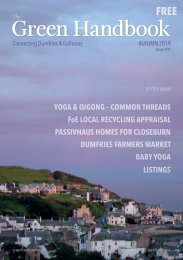The Green Handbook
Connecting Dumfries & Galloway. Summer 2020
Connecting Dumfries & Galloway. Summer 2020
You also want an ePaper? Increase the reach of your titles
YUMPU automatically turns print PDFs into web optimized ePapers that Google loves.
THE GREEN HANDBOOK
TO MASK OR NOT TO MASK
At the time of writing, mask
wearing has not been made
compulsory in the UK. In
March, I contacted a friend who
sews professionally and asked her to
make four cloth masks in case any of
us got ill and needed to self-isolate
within the house. At the same time,
a friend in the health service put out
a desperate message for protective
equipment, so the first batch of masks
ended up going to our local health
team. Thus began a cottage industry
in Moniaive, funded by the local
Community Council, supplying free
washable masks to people here who
wanted them. This is ongoing.
Unfortunately, like a lot of things, the
subject of mask-wearing has become
deeply politicised and mired with
conspiracy theories. Since January,
I have been following the research
and policies around the world and
in March, I took an online course
on the Covid-19 pandemic with
the London School of Hygiene &
Tropical Medicine. My firm opinion
on the subject is that wearing masks
significantly reduces the risk of
spreading the illness and, in a small
way, reduces the risk of catching it.
So should we be forced to wear masks
in public? Not really. Enforcing
these things is never the best way
forward. Unlike in some countries
– e.g. Republic of Ireland or New
Zealand – the public has not been
trusted with reliable factual public
information. Reluctance to promote
mask wearing goes back to the the
toilet paper shortage (which was
caused by poor public information
more than selfishness). Demand for
surgical masks might exacerbate PPE
shortages in the NHS. We have been
let down, and misled.
However, it’s simple. Covering the
nose and mouth reduce virus particles
flying out of our mouths when we
speak. And for shouting, coughing
and sneezing, the viurs travels far
greater than two metres. Indoors the
situation is worse and particles stay
suspended in the air much longer.
This is why the Scottish Government
has advised people to wear masks on
public transport and when shopping.
From a statistical point of view, one
person wearing a mask makes only a
tiny difference, but as more and more
people wear them, the community
risk of infection starts to reduce
dramatically. Wearing a mask is not
particularly pleasant, but it is a simple
act of kindness – about half the
people spreading coronavirus have no
symptoms at all and no idea they are
spreaders. It could be you or me.
8











